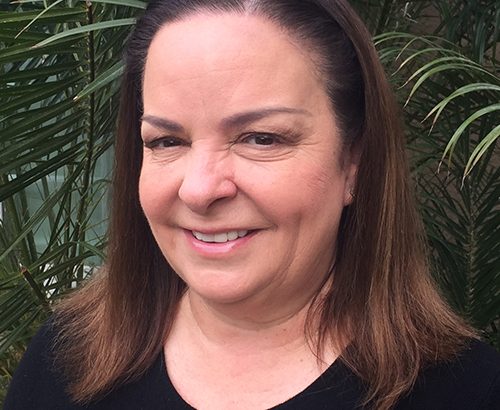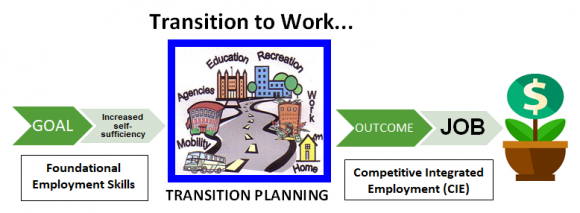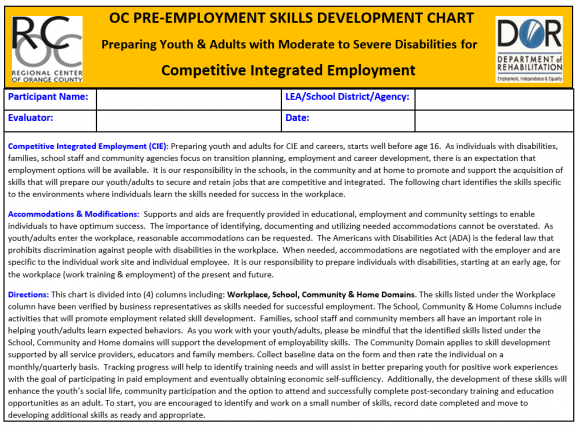
Transition to Work Transition Specialist and long-time educator, Linda O'Neal, discusses the key factors in the transition to work process
October 6, 2017
As we consider the long-term future of our youth with disabilities, it is critical to start with successful outcomes and work backward. Transition Planning includes: Education/Post-Secondary Education, Mobility, Connections to Resources, Independent Living, Recreation/Fitness & Work. All of these areas are essential, but for the sake of this blog we will concentrate on employment. The corner stone to effective transition planning is a focus on employment and a satisfying career with an ultimate goal of adult self-sufficiency.
Preparing youth and adults for Competitive Integrated Employment (CIE) and careers, begins well before age 16. It is our responsibility in the schools, in the community, and at home to promote and support the acquisition of skills that will prepare our youth/adults to secure and retain jobs that are competitive and integrated.
Having high expectations for all youth starting from pre-school is a great place to start. As we consider the meaning of success for our youth with disabilities, it is critical that we address the need for foundational employment skills. These are the skills and behaviors necessary for all jobs, and their development should be worked on at home, school, and in the community. Employers value these skills because they are linked to job performance and retention, getting along with co-workers, and long-term career success.
If you are interested in an expanded list of these skills, please see the “OC Pre-Employment Skills Development Chart” available through the Thompson Policy Institute Transition Initiative at https://www.chapman.edu/education/research/centers-and-partnerships/thompson-policy-institute/action/octi.aspx This tool identifies the skills specific to the environments (School, Community & Home) where individuals practice and learn the skills needed for success in the workplace. It is designed for use by parents, educators, and other service providers to monitor skill acquisition, track progress and assist in identifying training needs.
Transition/Employment Plans:
Identifying goals, objectives and activities specific to “Transition to Work” is essential to work training and competitive integrated employment. This should be started by the age of 16, and earlier if possible, on the Individual Transition Plan (ITP) which is part of the Individualized Education Plan (IEP) through the K-12 Special Education and Adult Transition Programs.
- Individual Transition Plan (ITP) –The ITP is the template for mapping out long-term adult outcomes from which annual goals and objectives are defined. The ITP must be based on the student’s needs, preferences and interests, and reflect the student’s own goals. Objectives, timeliness, and people responsible for meeting the objectives should be written into the ITP (and made part of the IEP). It is important to understand that transition planning and development of the ITP are part of the IEP process.
Additionally, students may be eligible for employment related services through Regional Center and/or Department of Rehabilitation. Employment and career related plans that should be considered include:
- Individualized Plan for Employment (IPE) – A term used by the California Department of Rehabilitation (CDOR) to refer to the contract between the client and the CDOR. The IPE contains important information on the client’s employment goal, and the services and supports the CDOR has agreed provide to assist the client in meeting that employment goal (CDOR serves individuals with disabilities once eligibility requirements are met).
- Individual Program Plan (IPP) – This written plan is similar to an Individualized Education Program (IEP). It outlines special services, goals, and objectives for a person who needs individualized help because of a developmental disability. The Regional Center and the Consumer develop the IPP. Specific employment and work training goals, etc. should be included (Regional Center eligibility requirements must be met to receive services).
Work-Based Learning (WBL) Opportunities:
To ensure preparation of individuals with disabilities for work training and employment, work-based learning (WBL) opportunities are essential. Non-paid and/or paid work experiences should be available to students in high school, adult transition, community college and/or through adult service provider agencies contracted by Regional Centers or Department of Rehabilitation. Examples include the following:
- Non-Paid WBL Opportunities:
Any experience that a person gains while working in a specific field or occupation. They are designed to expose students to work. Training may include Exploratory Work Experience which is a non-paid course of study for young people to get a feel for professional working environments. Additional opportunities may include: job shadows, internships, community based learning, and volunteer work.
- Paid WBL Opportunities:
Paid Employment may include existing standard jobs in a company or customized work assignments that are negotiated with an employer, but these jobs feature a wage paid directly to the youth. Such work may be scheduled during or after the school day. It may be integral to a course of study or simply a separate related experience. Specific options include: work experience, internship, on-the job training and apprenticeships.
WBL Accommodations:
Supports and aids are frequently provided in educational, employment, and community settings to enable individuals to have optimum success. To promote job retention, it may be necessary to identify accommodation(s) and provide support in their implementation. The importance of identifying, documenting, and utilizing needed accommodations cannot be overstated. As youth/adults enter the workplace, reasonable accommodations can be requested. The Americans with Disabilities Act (ADA) is the federal law that prohibits discrimination against people with disabilities in the workplace.
Accommodations include modifying a job, work training site, or the way in which a job is done so that a person with a disability can have equal access to all aspects of work. Job accommodations can make it possible for people with disabilities to: apply for jobs, perform essential job functions, be as productive as their co-workers, accomplish tasks with greater ease or independence.
It is essential that youth, adults, and families work with their local educators and service providers to ensure access to “Transition to Work” programming opportunities. Preparing individuals with disabilities for the workplace of the present and future is essential to quality of life for individuals with disabilities.
Linda O’Neal earned her Bachelor’s Degree in Psychology from the University of Southern California and her Master’s Degree in Special Education from California State University Los Angeles. She has worked in the education field for 39 years and has experience teaching in grades K-12 as a General Education Teacher, Special Education Teacher and Transition Specialist. In addition, Linda was a part-time faculty member at Chapman University for 25 years. Linda recently joined the Thompson Policy Institute (TPI) on Disability and Autism @ Chapman University, and will be working on a variety of transition programming projects. As a Program Specialist for San Diego State University Interwork Institute, she assists in writing, implementing and evaluating federal grants with a focus on career development for youth and young adults with a wide range of disabilities. Currently, she is the Principal Investigator/Program Specialist for three national grants including: the California PROMISE Initiative, California Career Innovations and the Workforce Innovation Technical Assistance Center. These programs focus on competitive integrated employment, career development and post-secondary education/training with a goal of promoting adult self–sufficiency and quality of life for individuals with disabilities.
Connect with Linda:


